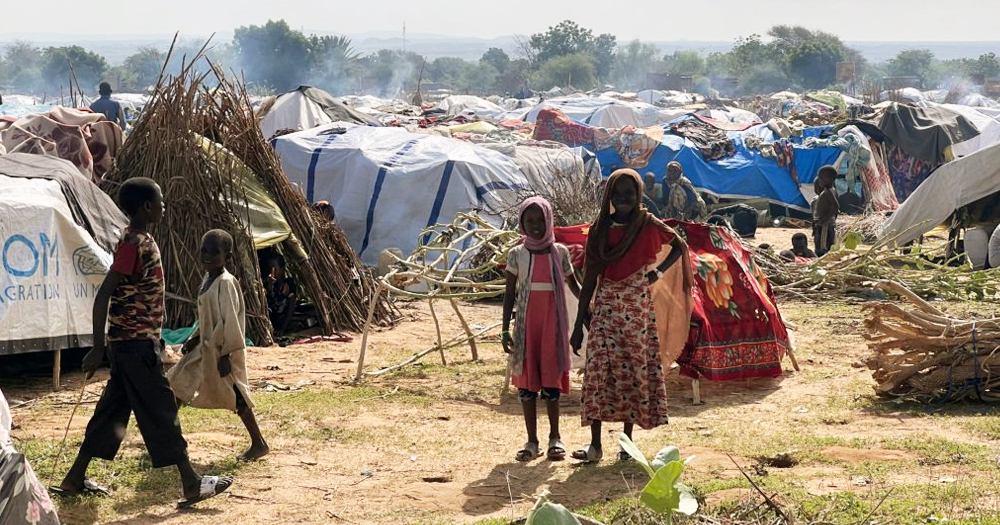Several displacement camps and the city of El-Fasher, the capital of North Darfur in Sudan, are grappling with famine following months of open war. Several people have already died of starvation, with the UN’s World Food Programme (WFP) warning of worsening conditions.
In April 2023, Sudan was plunged into civil war when a power struggle broke out between the official army, called the Sudanese Armed Forces (SAF), and the paramilitary group Rapid Support Forces (RSF). Now in its third year, the war has killed over 150,000 people and has caused about 12 million to flee their homes, in what the United Nations have described as the world’s largest humanitarian crisis.
The country has been effectively split into two, with the army controlling the north, east and centre, while the RSF dominates nearly all of Darfur, a region in western Sudan, and parts of the south. In Darfur, there have also been reports of mass killings and ethnic cleansing.
El-Fasher is the last major city in the Darfur region that is still under the army’s control, though it has been under siege by the RSF for over a year. Many people have sought refuge in the city after a major RSF attack on a displacement camp in Zamzam in April of this year forced hundreds of thousands of civilians to flee.
Last year, the UN declared famine in Zamzam and two other camps, al-Salam and Abu Shouk, as well as some parts of southern Sudan. Now, thousands of families trapped in El-Fasher because of the siege are “at risk of starvation”, the World Food Programme has stated. Because of scarcity in food supplies and limited humanitarian access, nearly 40% of children under five living in the city are now acutely malnourished, and 11% are suffering from severe acute malnutrition, according to the UN.
“The situation in El Fasher is completely catastrophic; the city’s population is on the verge of starvation,” said Leni Kinzli, a WFP spokesperson. “It is besieged, cut off from the rest of the country, and humanitarian access is extremely difficult.
“Since the city is under blockade, the prices of basic necessities have skyrocketed, and people cannot even buy enough to make one meal a day,” Kinzli said.
Reports have highlighted how some families ate animal fodder and food waste in order to survive. “And this is despite the fact that we are ready to intervene with food trucks if we are allowed to pass,” Kinzli added.
Meanwhile, North Darfur is also facing a cholera outbreak, with over 191 people having died due to the waterborne disease.
The war between the two groups in Sudan is still ongoing, with the RSF recently attacking one of the famine-hit refugee camps in Darfur and opening fire on the streets and inside homes. At least 40 civilians were “killed either by stray bullets or direct executions”, first responders said.
“Every day the conflict continues in Sudan, innocent lives are lost, communities are torn apart, and trauma continues to haunt generations,” said Radhouane Nouicer, the UN’s expert on human rights in Sudan. “The ongoing war has devastated civilian lives and turned daily survival into a constant struggle.”
All of this is happening while several UN agencies face one of the worst funding cuts in decades due to the Trump administration’s decision to slash foreign aid.
“Children have limited access to safe water, food, healthcare. Malnutrition is rife, and many good children are reduced to just skin, bones,” said Sheldon Yett, UNICEF’s representative in Sudan. “With recent funding cuts, many of our partners in Khartoum and elsewhere have been forced to scale back… We are being stretched to the limit across Sudan with children dying of hunger.
“We are on the verge of irreversible damage being done to an entire generation of children in Sudan.”
© 2025 GCN (Gay Community News). All rights reserved.
Support GCN
GCN is a free, vital resource for Ireland’s LGBTQ+ community since 1988.
GCN is a trading name of National LGBT Federation CLG, a registered charity - Charity Number: 20034580.
GCN relies on the generous support of the community and allies to sustain the crucial work that we do. Producing GCN is costly, and, in an industry which has been hugely impacted by rising costs, we need your support to help sustain and grow this vital resource.
Supporting GCN for as little as €1.99 per month will help us continue our work as Ireland’s free, independent LGBTQ+ media.
